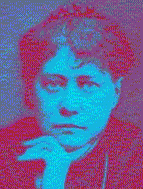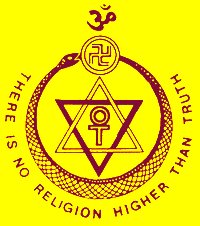The Key to Theosophy

Helena
Petrovna Blavatsky
1831
-1891
_______________________
The Key to Theosophy
By
Helena Petrovna Blavatsky
On Self-Sacrifice
Q. Is equal justice to all and love to every creature the highest
standard of
Theosophy?
A. No; there is an even far higher one.
Q. What can it be?
A. The giving to othersmore than to oneself-self-sacrifice. Such
was the
standard and abounding measure which marked so preeminently the
greatest
Teachers and Masters of Humanity-e.g., Gautama Buddha in History,
and Jesus of Nazareth as in the Gospels. This trait alone was enough to secure
to them the
perpetual reverence and gratitude of the generations of men that
come after
them. We say, however, that self-sacrifice has to be performed with
discrimination; and such a self-abandonment, if made without
justice, or
blindly, regardless of subsequent results, may often prove not only
made in
vain, but harmful. One of the fundamental rules of Theosophy is,
justice to
oneself-viewed as a unit of collective humanity, not as a personal
self-justice,
not more but not less than to others; unless, indeed, by the
sacrifice of the
oneself we can benefit the many.
Q. Could you make your idea clearer by giving an instance?
A. There are many instances to illustrate it in history.
Self-sacrifice for
practical good to save many, or several people, Theosophy holds as
far higher
than self-abnegation for a sectarian idea, such as that of
"saving the heathen
from damnation," for instance. In our opinion, Father Damien,
the young man of
thirty who offered his whole life in sacrifice for the benefit and
alleviation
of the sufferings of the lepers at
years alone with them, to finally catch the loathsome disease and
die, has not
died in vain. He has given relief and relative happiness to
thousands of
miserable wretches. He has brought to them consolation, mental and
physical.
He threw a streak of light into the black and dreary night of an
existence, the
hopelessness of which is unparalleled in the records of human
suffering. He was
a true Theosophist, and his memory will live forever in our annals.
In our sight
this poor Belgian priest stands immeasurably higher than-for
instance-all those
sincere but vain-glorious fools, the Missionaries who have
sacrificed their
lives in the
nation whose systems of religious philosophy are as grand as any,
if only the
men who have them would live up to the standard of Confucius and
their other
sages. And they died victims of irresponsible cannibals and
savages, and of
popular fanaticism and hatred. Whereas, by going to the slums of
Whitechapel or some other such locality of those that stagnate right under the
blazing sun of
our civilization, full of Christian savages and mental leprosy,
they might have
done real good, and preserved their lives for a better and worthier
cause.
Q. But the Christians do not think so?
A. Of course not, because they act on an erroneous belief. They
think that by
baptizing the body of an irresponsible savage they save his soul
from damnation.
One church forgets her martyrs, the other beatifies and raises
statues to such
men as Labro, who sacrificed his body for forty years only to
benefit the vermin
which it bred. Had we the means to do so, we would raise a statue
to Father
Damien, the true, practical saint, and perpetuate his memory
forever as a living
exemplar of Theosophical heroism and of Buddha- and Christ-like
mercy and
self-sacrifice.
Q. Then you regard self-sacrifice as a duty?
A. We do; and explain it by showing that altruism is an integral
part of
self-development. But we have to discriminate. A man has no right
to starve
himselfto death that another man may have food, unless the life of
that man is
obviously more useful to the many than is his own life. But it is
his duty to
sacrifice his own comfort, and to work for others if they are
unable to work for
themselves. It is his duty to give all that which is wholly his own
and can
benefit no one but himself if he selfishly keeps it from others.
Theosophy
teaches self-abnegation, but does not teach rash and useless
self-sacrifice, nor
does it justify fanaticism.
Q. But how are we to reach such an elevated status?
A. By the enlightened application of our precepts to practice. By
the use of our
higher reason, spiritual intuition, and moral sense, and by
following the
dictates of what we call "the still small voice" of our
conscience, which is
that of our Ego, and which speaks louder in us than the earthquakes
and the
thunders of Jehovah, wherein "the Lord is not."
Q. If such are our duties to humanity at large, what do you
understand by our
duties to our immediate surroundings?
A. Just the same, plusthose that arise from special obligations
with regard to
family ties.
Q. Then it is not true, as it is said, that no sooner does a man
enter into the
Theosophical Society than he begins to be gradually severed from
his wife,
children, and family duties?
A. It is a groundless slander, like so many others. The first of
the
Theosophical duties is to do one's duty by all men, and especially
by those to
whom one's specific responsibilities are due, because one has
either voluntarily
undertaken them, such as marriage ties, or because one's destiny
has allied one
to them; I mean those we owe to parents or next of kin.
Q. And what may be the duty of a Theosophist to himself?
A. To control and conquer,through the Higher, the lower self. To
purify himself
inwardly and morally; to fear no one, and nought, save the tribunal
of his own
conscience. Never to do a thing by halves; i.e.,if he thinks it the
right thing
to do, let him do it openly and boldly, and if wrong, never touch
it at all. It
is the duty of a Theosophist to lighten his burden by thinking of
the wise
aphorism of Epictetus, who says:Be not diverted from your duty by
any idle reflection the silly world may make upon you, for their censures are
not in your power, and consequently should not be any part of your concern.
Q. But suppose a member of your Society should plead inability to
practice
altruism by other people, on the ground that "charity begins
at home," urging
that he is too busy, or too poor, to benefit mankind or even any of
its
units-what are your rules in such a case?
A. No man has a right to say that he can do nothing for others, on
any pretext
whatever. "By doing the proper duty in the proper place, a man
may make the
world his debtor," says an English writer. A cup of cold water
given in time to
a thirsty wayfarer is a nobler duty and more worth, than a dozen of
dinners
given away, out of season, to men who can afford to pay for them.
No man who has not got it in him will ever become a Theosophist; but he may
remain a member of our Society all the same. We have no rules by which we could
force any man to become a practical Theosophist, if he does not desire to be
one.
Q. Then why does he enter the Society at all?
A. That is best known to him who does so. For, here again, we have
no right to
prejudge a person, not even if the voice of a whole community
should be against
him, and I may tell you why. In our day, vox populi(so far as
regards the voice
of the educated, at any rate) is no longer vox dei, but ever that
of prejudice,
of selfish motives, and often simply that of unpopularity. Our duty
is to sow
seeds broadcast for the future, and see they are good; not to stop
to enquire
why we should do so, and how and wherefore we are obliged to lose
our time,
since those who will reap the harvest in days to come will never be
ourselves.
__________________________

Find answers to more questions
with these Theosophy links
Dave’s
Streetwise Theosophy Boards
The Theosophy Website that
Welcomes Absolute Beginners
If you run a Theosophy Study Group,
please feel free
to make use of the material on this
Website
The Most Basic Theosophy
Website in the Universe
A quick overview of Theosophy
and the Theosophical Society
If you run a Theosophy Study Group you
can use this as an introductory handout.

Cardiff Theosophical Society meetings
are informal
and there’s always a cup of tea afterwards
The
Cardiff Theosophical Society Website
The
National Wales Theosophy Website
This is for
everybody not just people in Wales
Theosophy Cardiff’s Instant Guide
General pages
about Wales, Welsh History
and The History
of Theosophy in Wales
Independent Theosophy Blog
One liners and quick explanations
About aspects of Theosophy
H P Blavatsky is usually the only
Theosophist that most people have
ever
heard of. Let’s put that right
Lentil burgers, a
thousand press ups before breakfast and
the daily 25 mile
run may put it off for a while but death
seems to get most
of us in the end. We are pleased to
present for your
consideration, a definitive work on the
subject by a
Student of Katherine Tingley entitled
An
Independent Theosophical Republic
Links to Free Online Theosophy
Study Resources; Courses, Writings,
No
Aardvarks were harmed in the
The Spiritual Home of Urban Theosophy
The Earth Base for Evolutionary Theosophy
Classic Introductory
Theosophy Text
A Text Book of Theosophy By C
What Theosophy Is From the Absolute to Man
The Formation of a Solar System The Evolution of Life
The Constitution of Man After Death Reincarnation
The Purpose of Life The Planetary Chains
The Result of Theosophical Study
An Outstanding
Introduction to Theosophy
By a student of
Katherine Tingley
Elementary Theosophy Who is the Man? Body and Soul
Body, Soul and Spirit Reincarnation Karma
Preface
Theosophy and the Masters General Principles
The Earth Chain Body and Astral Body Kama – Desire
Manas Of Reincarnation Reincarnation Continued
Karma Kama Loka
Devachan
Cycles
Arguments Supporting Reincarnation
Differentiation Of Species Missing Links
Psychic Laws, Forces, and Phenomena
Psychic Phenomena and Spiritualism
Quick Explanations with Links to More
Detailed Info
What is Theosophy ? Theosophy Defined (More Detail)
Three Fundamental Propositions Key Concepts of Theosophy
Cosmogenesis
Anthropogenesis
Root Races
Karma
Ascended Masters After Death States Reincarnation
The Seven Principles of Man Helena Petrovna Blavatsky
Colonel Henry Steel Olcott William Quan Judge
The Start of the Theosophical Society Theosophical Society Presidents
History of the Theosophical Society Glossaries of Theosophical Terms
History of the Theosophical Society in Wales
The Three Objectives of the Theosophical Society
Explanation of the Theosophical Society Emblem
Karma Fundamental Principles Laws: Natural and Man-Made The Law of Laws
The Eternal Now
Succession
Causation The Laws of Nature A Lesson of The Law
Karma Does Not Crush Apply This Law
Man in The Three Worlds Understand The Truth
Man and His Surroundings The Three Fates
The Pair of Triplets Thought, The Builder
Practical Meditation Will and Desire
The Mastery of Desire Two Other Points
The Third Thread Perfect Justice
Our Environment
Our Kith and Kin Our Nation
The Light for a Good Man Knowledge of Law The Opposing Schools
The More Modern View Self-Examination Out of the Past
Old Friendships
We Grow By Giving Collective Karma Family Karma
National Karma
India’s Karma
National Disasters
Try these if you are looking
for a
local Theosophy Group or Centre
UK Listing of Theosophical Groups